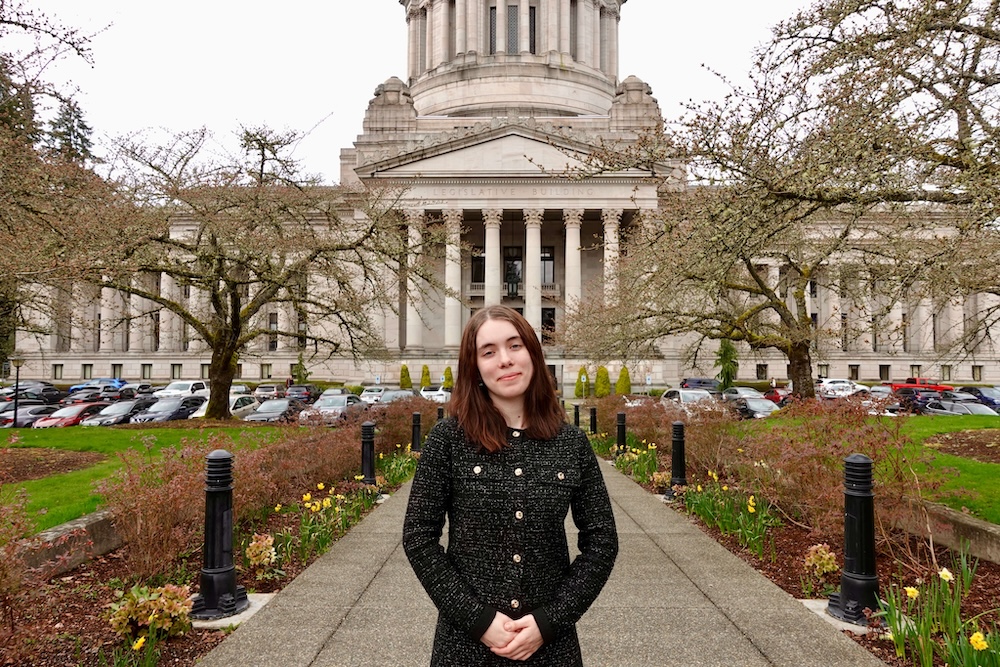“I feel seen and heard, like I matter.”
These heartfelt words from Amber Fox cut to the core of the work of student in the University of Washington Bothell’s course Population-based Health in Community Practice.
Fox, a resident at the Everett Gospel Mission Women & Children’s Shelter, is used to being dismissed and dehumanized for being a homeless addict.
“One time I was really depressed and covered myself in blankets. I wanted to hide from myself,” Fox said. “But then the students checked on me, really listened to me. They brought me out and went for a walk with me.
“They were so kind. They didn’t make me feel ‘less than.’ You can’t imagine what that’s like unless you’ve walked in shoes like mine.”
Community practice is a key component of the School of Nursing & Health Studies course taught by Dr. Mabel Ezeonwu, associate professor, and Tara James, lecturer. The Everett women’s shelter has worked with these faculty and students in the course for several years — and continued to open its doors to them during the coronavirus pandemic.
An unusually natural fit
One of the other community partners slated to offer projects for the course in summer 2020 declined as the academic quarter neared, and Ezeonwu was left to do some quick thinking.
“This was the last quarter for some of our students, and they needed practical experience to graduate,” she said. “Partnerships take time to develop. You can’t just walk in and say, ‘Hi, we have students who can work with the people you serve.’ We have to educate them on the value of what we have to offer and their responsibilities as a partner. How were we going to find one on short notice?”
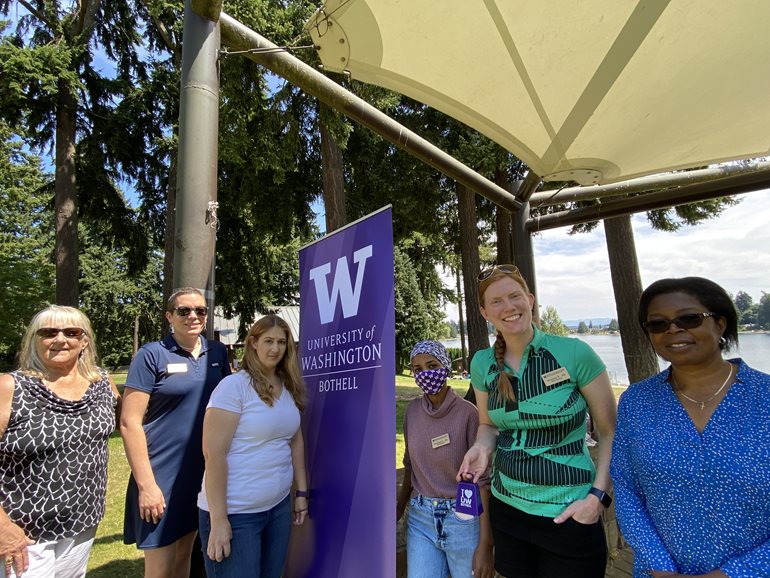
Ezeonwu shared her concern with Karen Bowman, a retired SNHS lecturer and president of Karen Bowman & Associates. Bowman had an idea immediately: the Des Moines Area Food Bank, where she was a regular volunteer. “Food bank leadership knew Karen and trusted her recommendation to work with us,” said Ezeonwu. “We were able to get our students in, they were able to graduate on time, and we have a continuing partner!”
Amanda Day, a nurse in the summer 2021 course who works at the Snohomish County Jail, said, “I was a little surprised that we would be working with a food bank. But I quickly learned that nursing crosses into many areas. Our work is not just in a clinical setting.”
Bowman, who received her bachelor’s degree at UW Bothell, said she was “thrilled” for the opportunity to make this new connection with DMAFB. “I knew it might be seen as an unusual pairing,” she said, “but the population served by the food bank represents those the students see in their everyday work.
“Nurses are trained to always look and sense and question. Working with the food bank put that training to great use.”
A healthy community
For River Leonovich, a nurse at Hospice of the Northwest, the partnership with the food bank gave life to the past year.
“After meeting with the cohort over Zoom for much of the program, it was really great to see each other in person,” Leonovich said. “There’s no substitute for working together to serve the community.”
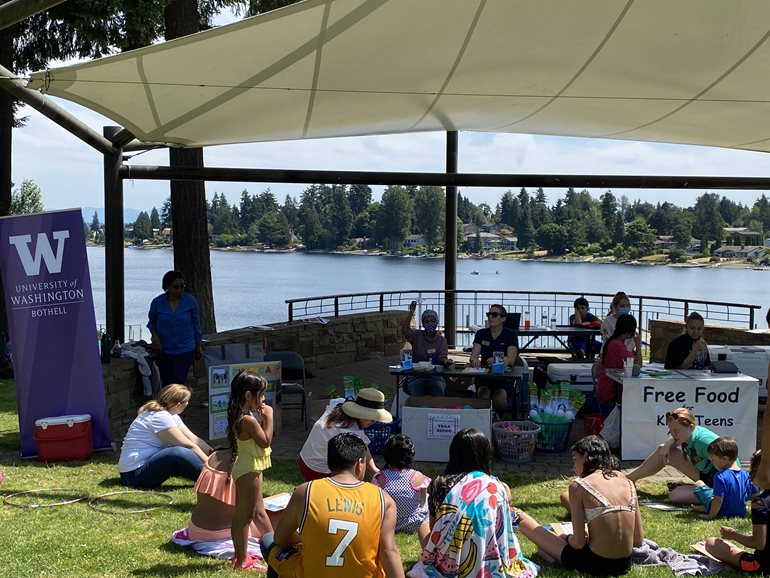
While some of the projects the students were tasked with took place at the food bank, such as giving presentations on body mechanics and outdoor heat exposure, much of the time was spent at Angle Lake Park in Des Moines. There, they engaged with children and their families through the DMAFB’s summer meal program, distributing nutritious lunches, playing games, answering health-related questions and demonstrating the importance of getting the entire family to stay active.
“Because of the pandemic, kids didn’t have access to P.E. (physical education), and some of them live in neighborhoods that aren’t conducive to walking or playing,” said Merhawit Kasay, a nurse who plans to begin a DNP program in 2022. “We found they were very receptive to learning some basic exercises and introductory yoga poses that they could do with their parents and siblings at home.
“We stressed the importance of being active for one hour every day,” she said. “I felt good being able to contribute to the health of the community in that way.”
Rethinking first impressions
At the women and children’s shelter in Everett, students first undergo Poverty 101, a training conducted by Suzanne Peterson that showcases the unique challenges of long-term poverty.
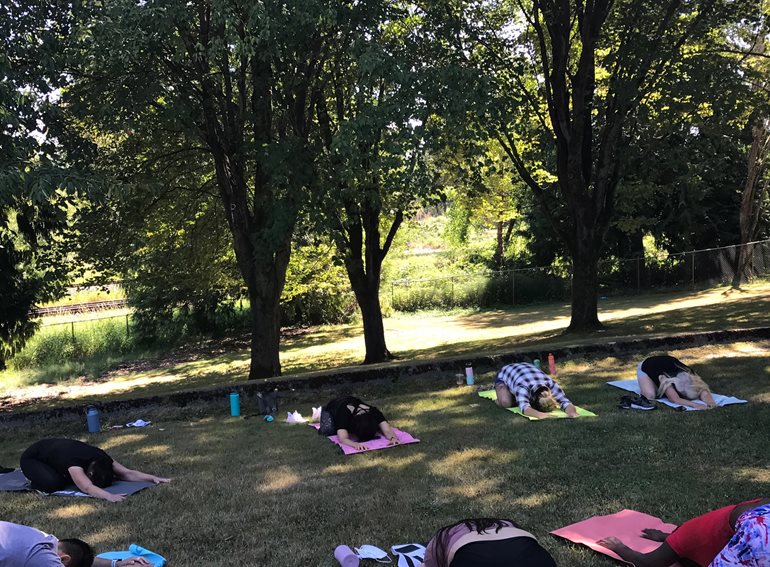
“We discuss the first impressions we all form when we see an unsheltered person,” said Peterson, shelter director, “and how unfair it is to that person when we’ve labeled them without even asking for their backstory. The training both challenges and changes the students’ approach to the people they care for.”
Gillian Estrada, a nurse in the newborn intensive care unit at Providence Regional Medical Center in Everett, said that the training helped her think about the generational cycle of poverty in relation to the parents of some of her patients. “We can be so quick to make generalizations about people based on their histories,” Estrada said. “The experience at the shelter opened my eyes to biases I wasn’t aware I had. Many of our parents in the NICU come from similar backgrounds as the residents at EGM, with sometimes similar stories.
“This work in the community has given me a fuller picture of what my families in the NICU experience on a daily basis.”
Working directly with the residents and their children was also an eye-opener for Dawn Schober, a nurse in the inpatient behavioral health unit at Providence. She described a memorable group activity during which she and the other students were making yogurt pops with the kids. One of the mothers joined the conversation with nutritional information “which was very informative,” Schober said. “It was an educational moment for me to learn she had been to college and had taken a lot of nutrition classes.”
Kindness wins
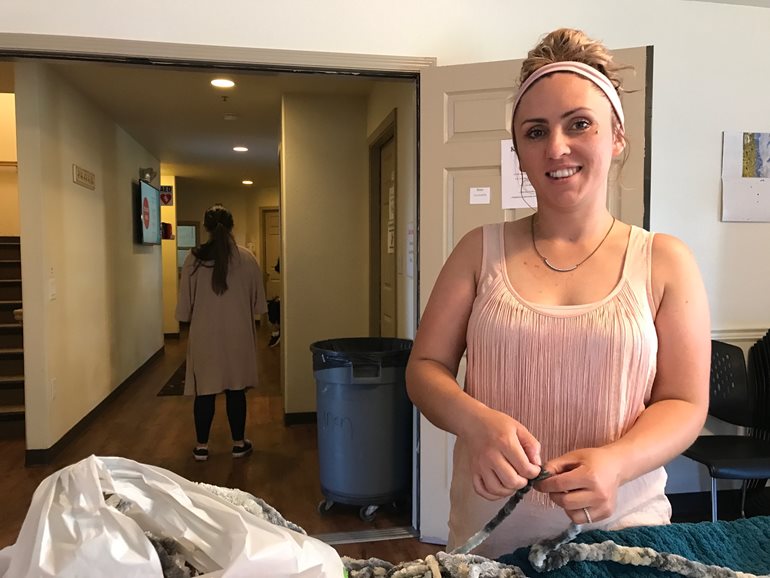
Fox said she appreciated the opportunity to share her personal history with the nurses. A 4.0 student growing up, she was a certified medical administrative assistant with a perfect working history before addiction took over her life, a trait she inherited from her parents.
“Even with an education, a good job and three kids to raise, I couldn’t resist the power drugs had over me,” she said. “I lost everything, including my kids. The students listened to my stories and made me feel worthwhile, not just an addict with mental issues. They saw me as a mother who loves her kids and who will do anything to get them back.
“Having them listen to me really boosted my confidence,” she said. “I’m more hopeful, which has helped me cope and try new things. I just learned how to knit, and I’m making a quilt for each of my kids so they have something from me until we can be together again.
“The students’ support really made a difference for me, and now they’re impacting my kids, too.”



